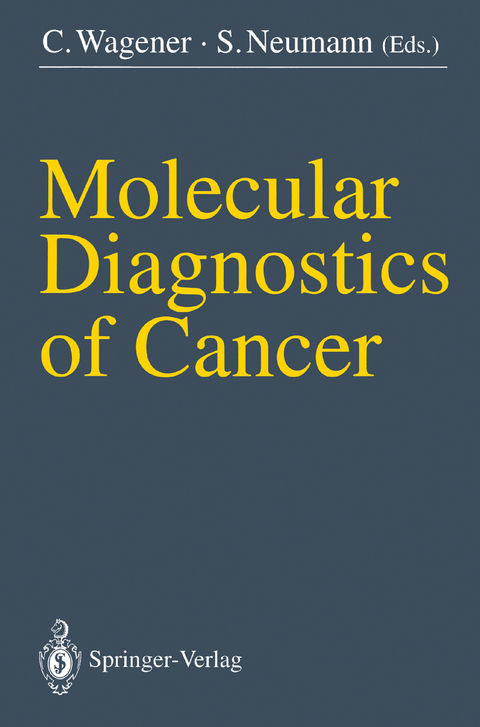
Molecular Diagnostics of Cancer
Springer Berlin (Verlag)
978-3-540-55476-9 (ISBN)
strategies basedon the direct or indirect detection of
cancer genes are delineated in this volume. Among the
methodological aspects covered are enzymatic target
amplification by the polymerase chain reaction and related
techniques, DNA fingerprinting, transfer of putative cancer
genes in appropriate receipient cells, and recent
developments inthe application of monoclonal antibodies in
immunohistochemistry and immunoscintigraphy. The diagnostic
and functional implications of mutations in cancer genes
such as ras and p53 are described. The characterization of
cancer genes and their products is correlated with growth
control anddissemination of tumour cells by in vitro or
clinical evidence. The contributions in the present volume
uptdate the information available on established or newly
described cancer genes, and may help manage the transition
from basic research to clinical practice.
The Polymerase Chain Reaction: Methodology and Diagnostic Potential.- Gene Loss as Marker in Tumor Development: Considerations on the Origin of Specific Brain Tumors Due to Combinant Loss of Function Mutations of Tumor Suppressor Genes.- p53: Oncogene, Tumor Suppressor, or Both?.- Tumor Genome Screening by Multilocus DNA Fingerprints as Obtained by Simple Repetitive Oligonucleotide Probes.- Activation of ras Oncogenes in Human Tumours.- Laboratory Techniques in the Investigation of Human Papillomavirus Infection.- Detection of Minimal Residual Leukemia by Polymerase Chain Reactions.- A Dominant Metastogene Confers Metastatic Potential to Tumor Cells.- Progression in Human Melanoma Is Accompanied by the Altered Expression of Cell Adhesion Molecules.- Structure, Function and Expression of the CEA Gene Family: Diagnostic and Therapeutic Implications.- Membrane Proteins as Markers for Normal and Neoplastic Endocrine Cells.- Biological and Clinical Relevance of the Tumor-Associated Serine Protease uPA.- Analysis of Growth Regulatory Pathways in Human Neuro-Oncology.- HER-2/Neu/c-ERB-B2 Amplification: Clinical Relevance in Mammary Carcinoma.- Cytokine-Mediated Regulation of Growth Factor Receptors (EGF-R and erb-B2) in Pancreatic Tumors.- Chimeric CEA-Specific Antibody Fragments and Anti-idiotypic Antibodies for Immunoscintigraphy and New Therapeutic Approaches to Colorectal Carcinomas.- Tumor Localization by Immunoscintigraphy: Potential and Limitations.
| Erscheint lt. Verlag | 4.12.1992 |
|---|---|
| Zusatzinfo | IX, 223 p. 38 illus. |
| Verlagsort | Berlin |
| Sprache | englisch |
| Maße | 155 x 235 mm |
| Gewicht | 380 g |
| Themenwelt | Medizin / Pharmazie ► Medizinische Fachgebiete ► Onkologie |
| Studium ► 2. Studienabschnitt (Klinik) ► Anamnese / Körperliche Untersuchung | |
| Studium ► 2. Studienabschnitt (Klinik) ► Pathologie | |
| Studium ► Querschnittsbereiche ► Infektiologie / Immunologie | |
| Naturwissenschaften ► Biologie ► Biochemie | |
| Naturwissenschaften ► Biologie ► Genetik / Molekularbiologie | |
| Schlagworte | Cancer • carcinoma • Cell • Cytokine • Diagnostics • DNA • Human cancer • Krebs • Krebs (Krankheit) • Krebs (Krankheit) / Karzinom • melanoma • Molecular Diagnostics • molekulare Diagnostik • Mutation • Nucleotide • Oncogene • Oncogenes • Oncology • Onkogene • Protein • receptor • Screening • Tumor • Tumor-Suppressor-Gene • tumour suppressor genes |
| ISBN-10 | 3-540-55476-9 / 3540554769 |
| ISBN-13 | 978-3-540-55476-9 / 9783540554769 |
| Zustand | Neuware |
| Haben Sie eine Frage zum Produkt? |
aus dem Bereich


